Traditional Polish Food – 18 Foods from Poland You Have to Try
Having spent an obscene amount of time in Poland over the last several years, I’ve become very well-acquainted with traditional Polish food.
Due to the months that I’ve spent teaching in Poland, staying way off the beaten path in tiny villages that are impossible to pronounce, I’ve been able to sample so many Polish dishes that it’s safe to say I kinda know what I’m talking about when it comes to Polish food!
So many travel bloggers spend 3 days in Poland, try some pierogi and write their ‘Ultimate Lists’ of ‘Must Try Traditional Polish Food!’ when the reality is that they haven’t personally tried half of the things on the list, and the things that they have tried, they’ve only eaten once in a touristy restaurant.
With this in mind, I wanted to take my experiences and create a super in-depth guide to foods from Poland that most tourists will never even come close to trying.
From weird Polish food like blood sausage and tripe soup to the more famous Polish food like zapiekanki and pierogi, this list has got it all.
So, without further ado, let’s get into it.
Here is my guide to traditional Polish food, including 18 foods from Poland that you simply have to try.
Traditional Polish Food – 18 Foods from Poland You Have to Try
So, what is traditional Polish food like?
In a word, Polish food is heavy.
Stodgy ingredients such as meat, bread and potatoes make up the bulk of Polish dishes, with a tangy side of sauerkraut or pickled cucumber.
Traditional Polish food is the kind of hearty comfort food that keeps you warm in the winter months, when your eyelashes have turned to ice and you can see your breath in front of you.
Some of the best foods from Poland are real belly filling stuff, and if you’ve ever been to Prague, you might find that Czech food is very similar to Polish food.
Traditional Polish foods get you ready for a long day of work and help you sleep easily. That said, it would be inaccurate to say that Polish cuisine is all about stodge.
Added to the generous helpings of butter and cream are plenty of delicate spices, and when you factor in the Polish tendency to stew everything, the rich flavours that you will encounter on a Polish plate are like no other.
Ingredients that are seemingly a mismatch (herring and cream? raw beef and pickles?) actually go surprisingly well together, and the phrase ‘don’t knock it until you’ve tried it!’ could have been invented for weird Polish food!
So, with that said, let’s take a look at the traditional Polish food that you simply have to try!
18 Foods from Poland You Simply Have to Try!
1. Befsztyk tatarski (beef tartare)
Pronounced – bef-shtik tatar-skee
This one is a little difficult for my fellow Brits to stomach, but beef tartare (sometimes spelled beef tartar) is one of my favourite foods from Poland.
Beef tartare is ground raw beef topped with a raw egg yolk and served with chopped onions and pickled cucumber, along with a hunk of thick crusty bread.
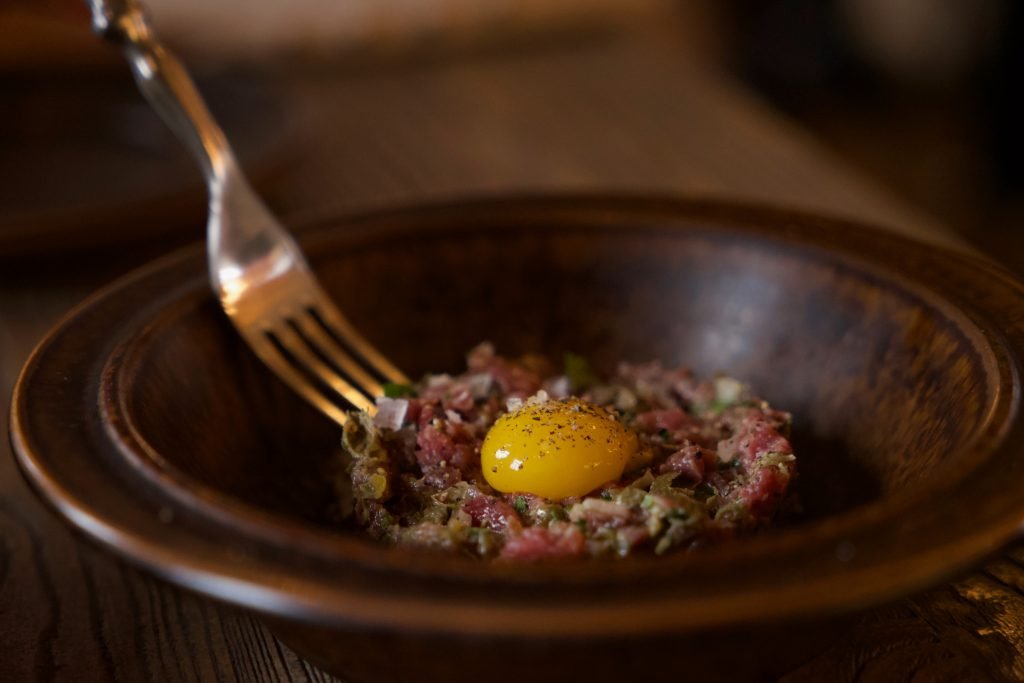
Not only do the strong flavours of pickle and onion create an explosion on the palette, but the marrying of textures, particularly that of the raw beef with the egg yolk, come together to create a unique and tasty dish.
The best way to eat beef tartare is to pour the egg yolk into the middle of the raw beef and then mash everything up together – I tend to use the bread to mop up the remains but some people prefer to spread the tartare right onto the bread. Beef tartare can be found everywhere from the dingiest Polish pubs to top restaurants, and is a must try for meat-lovers!
2. Żurek
Pronounced – the Ż is pronounced like the si in vision
If there’s one thing that Polish people have mastered the art of, it’s soup (or zupa).
Polish grandmothers countrywide have served up bowlfuls of Żurek for generations to hungry families, and there is no sign of the Polish love for this soup slowing down.
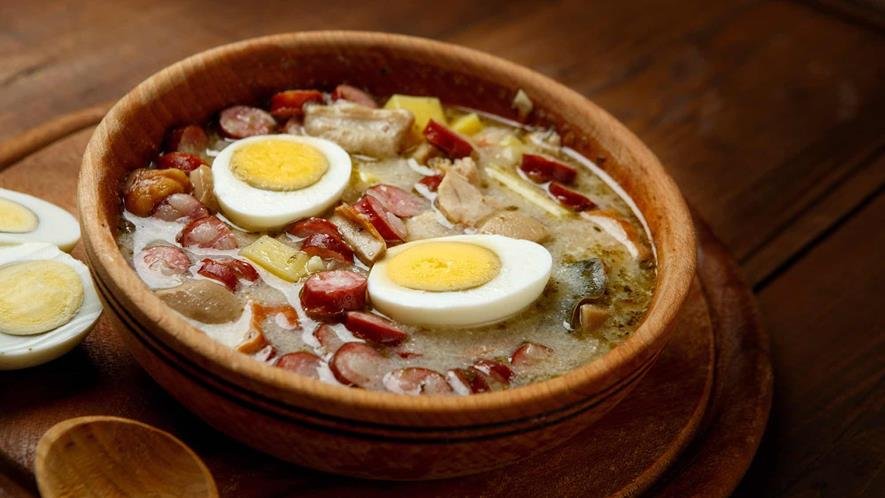
Żurek is a sour rye soup with added potatoes, kiełbasa (Polish sausage) and a boiled egg.
Salty and hot, Żurek is real hearty winter food, and it feels like a hug from the inside.
Pro tip – Żurek is especially good for hangovers, so you’ll need it after a night on the Polish vodka 😉
3. Pierogi
If there’s one word that springs to everyone’s mind when they think of traditional Polish food, it’s pierogi (contrary to what most people think, ‘pierogi’ is already plural so you don’t need to add an S)!
Pierogi are a hugely popular Polish food, famous all around the world, and they are a kind of dumpling which can be stuffed with various fillings, either sweet or savoury.
A common type of pierogi are pierogi ruskie which are dumplings filled with potatoes and cheese, but pierogi can be filled with anything from cabbage, to meat, to mushrooms. I personally prefer sweet pierogi, such as blueberry pierogi with cream – mmm!
That being said – and I know I’m going to trigger a lot of people with this – I think that pierogi are overrated.
It isn’t that they’re not good, it’s just that there is so much more to traditional Polish food than dumplings, and I urge you to try a few more items on this list before making your mind up that pierogi are the be all and end all!

4. Kiełbasa
Pronounced – kiow-basa
Kiełbasa is the catch-all term for Polish sausage, which is coarser in texture and more garlicky than other types of sausage, and comes in many different forms.
The most popular is Kiełbasa Polska, which is is salty, smoky and delicious.
Kiełbasa can be eaten hot or cold, and boiled, baked or grilled. They can be thrown into soups, stews and more, and are a real staple of Polish cuisine.
However, if you’re vegan, fear not! My friend and I actually found some vegan kiełbasa in the supermarket which tasted great on the BBQ!

5. Bigos
Bigos, or hunter’s stew, is one of the most popular Polish dishes, and rightly so!
Bigos is made with sauerkraut, kiełbasa (as well as other kinds of meat – usually whatever’s in the fridge!), mushroom and onion.
It is a strange mixture of flavours that actually works really well and is best enjoyed with boiled potatoes and (what else?) a glass of chilled vodka.
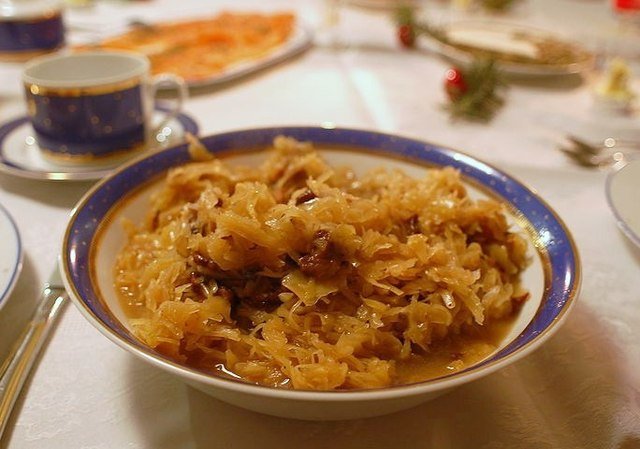
6. Barszcz czerwony
Pronounced – barsh-tch tcher-vony
Barszcz czerwony, also popular in Ukraine, is a red beetroot soup served with a dollop of sour cream (and sometimes potato dumplings) and is perfect for those harsh Polish winters.

It’s hot, it’s comforting, and if you visit a Christmas market in Poland, you will often see gloved hands wrapped around paper mugs of barszcz.
This is another incredibly common Polish soup.
7. Kotlet schabowy
Pronounced – kot-let s-hab-oh-vee
Perhaps the most quintessential of all the foods from Poland, kotlet schabowy is literally a breaded pork cutlet, similar to schnitzel, which is often served with potatoes and dill and red cabbage.
Not the most delicate or sophisticated of dishes, but this is a typical working man’s lunch that is served up in milk bars all across the country.

8. Flaki
We’re back on the Polish soup again, and this one is not for the faint-hearted!
Flaki may be a weird Polish food but it is one of my favourite Polish soups, and if you can get past the ‘ick’ factor, you might find that you quite like it too!
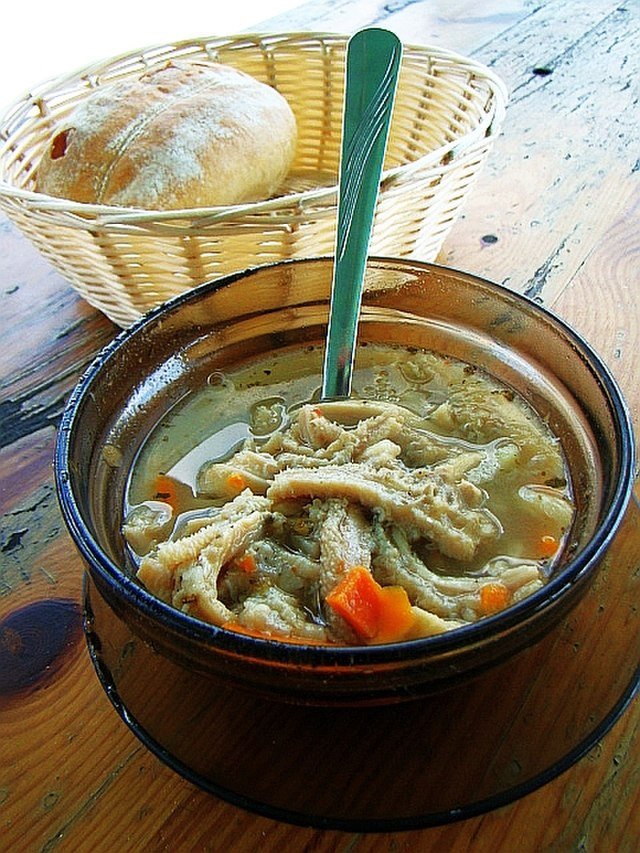
Flaki is a clear beef broth with strips of beef tripe, veggies, herbs and spices.
Yes, tripe seems kinda weird if we’re not used to it, and the texture is a little funky, but I genuinely really love flaki – even if the literal translation of flaki is ‘guts’!
9. Zapiekanka
Pronounced – zap-yeh-kanka
Zapiekanka (or zapiekanki plural) is a Polish street food most popular in Krakow, and it’s kind of like a pizza bread.
The classic zapiekanka is half a baguette with sauteed white mushrooms and grated cheese, toasted until the cheese melts (but many additional toppings can be added).
Zapiekanki can always be bought ready-made at service stations and corner shops, and these zapiekanki are really nothing special.
HOWEVER, the Plac Nowy (New Square) in the Kazimierz district of Krakow has turned zapikanki into an art form, and buying a zapiekanka from Plac Nowy is a rite of passage for anyone visiting Krakow.
Here, you can add a seemingly endless variety of toppings, and the zapiekanki at Plac Nowy are worlds apart from the ones you can buy at gas stations.
Perfect as a lunch on-the-go or messy drunk food, zapiekanki are the soul of Krakow.
I tried the Oscypek smoked cheese with cranberry (in addition to the mushroom and cheese base) and despite not being something I would usually choose, I really enjoyed it.
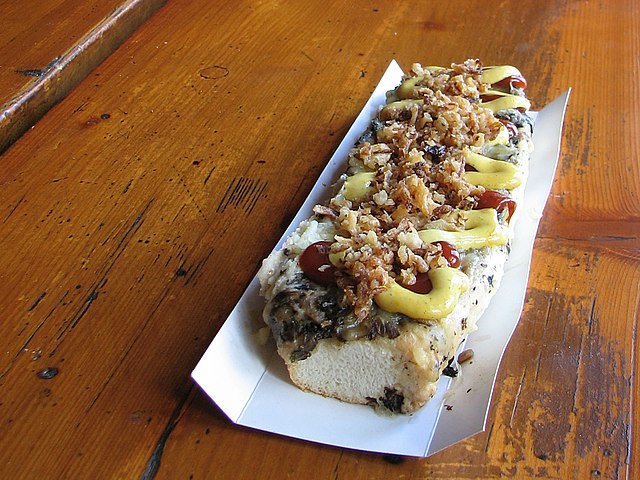
10. Placki ziemniaczane
Pronounced – platz-ki jee-em-nee-ah-char-ney
Placki ziemniaczana (literally – potato pancakes) are like the best hash brown you’ve ever tasted and then some.
Contrary to hash browns though, placki ziemniaczana are often served as the main part of a meal, with cheese, onions, sausage and more, and you don’t want to miss getting your hands on a plate of placki ziemniaczane when you visit Poland.
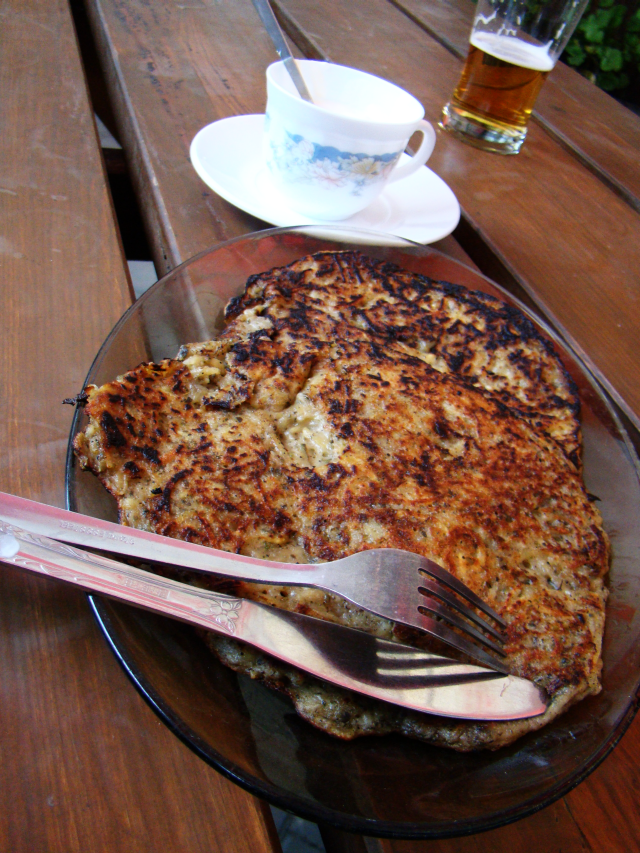
11. Smalec
Pronounced – smar-letz
If you want to feel like a big strong Polish man then get yourself a pint of beer, cut yourself a thick hunk of bread, and spread copius amounts of smalec on it.
Smalec (lard) is literally pig fat flavoured with onion, garlic, spices, and with added sprinklings of skwarki (pork cracklings) for extra crunch.
Smalec on bread is a great accompaniment to any meaty dish in Poland, and I attribute the 10lbs I gained in Poland to way too many campfires with sausages and smalec.
12. Oscypek
Pronounced – os-tseh-pek
Much like zapiekanki, Oscypek is something that you have to eat in the right place.
While you can buy it in supermarkets all over Poland, to get an authentic experience with this traditional Polish food, you have to go to the Tatra mountains.
Oscypek is a spindle-shaped smoked cheese made from sheep’s milk, hailing from the Podhale region of Poland.
It is usually fried and eaten with cranberry marmalade, with the sweetness from the cranberry taking the edge off the strong smoked flavour of the cheese.
Unlike most cheeses nowadays, Oscypek is made by a shepherd and his apprentice, living in a small mountain hut with a hearth. The workers stay in the mountains for the entire season, making the cheese by hand and passing the skill down through generations.
Knowing the process makes it extra special to sit in the mountains, looking out at the snow and clutching a hot mug of mulled wine while savouring the cheese.

13. Golonka
Golonka, or pork knuckle, is one of those traditional Polish foods, popular in pubs, that are perfect for cold winter nights by the fire.
The whole knuckle is served in the middle of the plate, usually accompanied by sauerkraut, horseradish and boiled potatoes, and really fills the belly in the way that good comfort food should.

14. Gołąbki
Pronounced – go-wamb-kee
Literally translating to ‘little pigeons,’ gołąbki is a dish that we would call ‘cabbage rolls’ in English.
Almost like a Polish burrito, gołąbki are made by boiling cabbage leaves and stuffing them with beef, onion and rice or barley (ingredients can vary of course), before fashioning them into parcel shapes and pouring tomato sauce over them.
According to Wikipedia, Polish cabbage rolls are the ‘epitome of Polish nourishment,’ so you’d better not skip them when you’re sampling traditional Polish food.
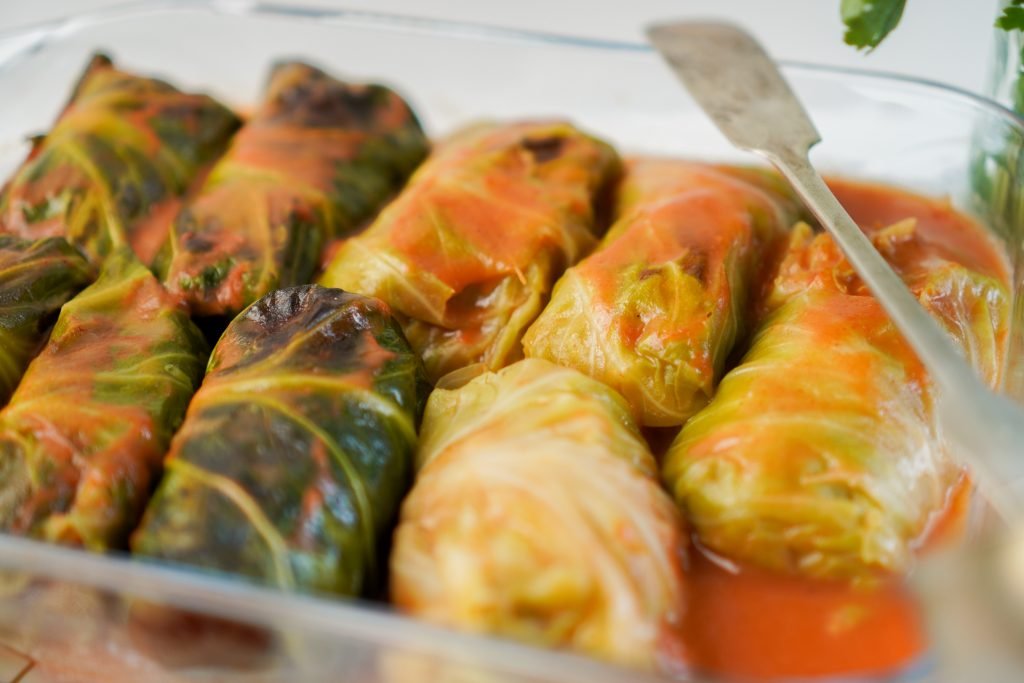
15. Kaszanka
Pronounced – kash-anka
Oh, kaszanka my old friend!
While some people may see kaszanka as a weird Polish food, I come from a town where ‘black pudding’ is famous, and I have been brought up on the ‘World Famous Bury Black Pudding,’.
Made by blending buckwheat with pig’s blood, kaszanka has a much softer texture than British black pudding, and literally falls apart in the mouth.
While we Brits tend to leave black pudding for breakfast time, the Poles are a bit more relaxed, and it isn’t unusual to order a huge plateful of kaszanka and nothing else from the Polish Christmas markets!
It may be a betrayal to Bury to say this, but I actually prefer kaszanka to Bury Black Pudding.
16. Zupa ogórkowa
Pronounced – zoopa og-oork-ova
Full disclosure: I can’t stand zupa ogórkowa (literally – gherkin soup).
I am not a fan of pickled cucumber generally, unless I’m crunching one as a chaser to vodka (don’t knock it till you’ve tried it).

However, Polish people LOVE pickles, and if you’re looking for a traditional Polish experience, then look no further than zupa orgókowa.
While foodie websites will tell you it’s a ‘hot and sour soup made with gherkins, potatoes and vegetables,’ just believe me when I say that it’s pickle soup and it tastes exactly what you would imagine pickle soup to taste like – pickles.
17. Zrazy
Zrazy are beef rolls stuffed with various fillings (don’t be surprised if you get pickle and bacon!), which are fried and then placed in a casserole with celery, onions and spices.
Not for those on a diet, zrazy are very typical of Polish cuisine – meaty, heavy and rich.
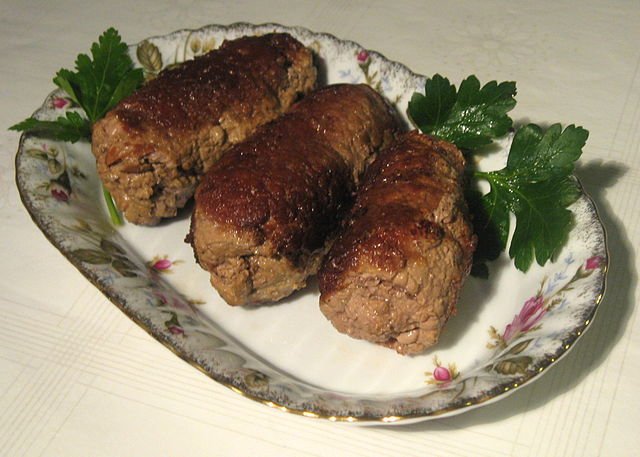
18. Rosół
Pronounced – ros-oow
Rosół seems, to the untrained palate, to be a simple chicken noodle soup, but don’t tell that to a Polish person!
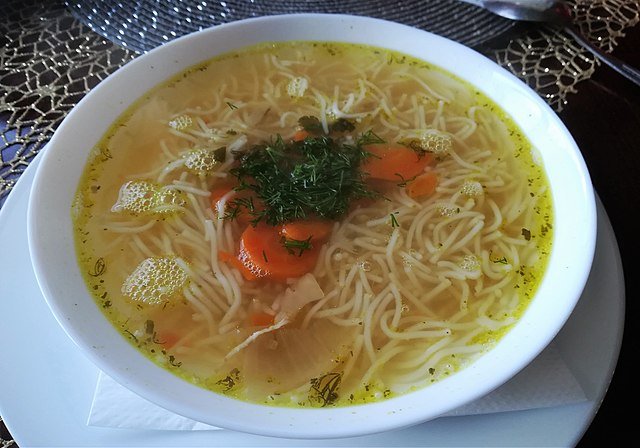
Commonly served at weddings as a starter, rosół is a meat broth with noodles, parsley, butter, salt and pepper, dill and vegetables such as celery, carrot and leek.
Don’t be surprised if you get served rosół in a Polish household!
Traditional Polish Food Experiences You Have to Have
If you’re planning a trip to Poland and you want to indulge in alllllll the yummy traditional Polish food on offer, the best way to do so is via a food tour or experience.
I love taking part in food tours when I travel because not only are you learning about things from a local, but you can rest assured that you’re tasting the real deal, far away from tourist traps and overpriced rubbish.
Here are my top recommendations for food tours in Poland:
Food tours in Krakow
Krakow 4-hour Polish food tour.
Krakow Vodka tour.
Food tours in Warsaw
Polish dumplings cooking class.
4-hour Polish food tour in 4-6 restaurants.
Private Polish beer tasting tour.
Food tours in Wroclaw
Guided food, drinks and history tour.
Private Polish Vodka tasting tour.
Private traditional Polish food tour.
Traditional Polish Food – Final Thoughts
So that just about brings us to the end of both the delicious and weird Polish food that you are likely to encounter if you visit Poland.
While some of it may seem a little scary (tripe? raw beef?), traditional Polish food is some of the heartiest (and yummiest!) food around, so be brave and don’t knock it until you’ve tried it!
More Food Guides
Guide to Valencian Food
Guide to Czech Food
Guide to Bulgarian Food
Guide to Balkan Food
Guide to Food in Malaga
Guide to Irish Food
Guide to Sicilian Food
Guide to Greek Food
Guide to Roman Food
Street Food in Catania
Street Food in Palermo
Italian Breakfast Guide
Moroccan Breakfast Guide
Italian Aperitivo Guide
Violife Cheese Review
Until next time,
XOXO
If you liked this article and would like to support my work, please click the button above to donate a couple of bucks and buy me a coffee. The ad revenue that I receive on this website is minimal, so support from my readers enables me to keep creating content that you (hopefully!) love to read.


This is a really helpful article! Going to Krakow in a few weeks and getting over excited about blood sausage!
Oh it’s SO SO GOOD!! I am jealous, hahaha. You should definitely find it at the Christmas markets!
Keshka, I am Polish-American, but still must beg spelling ignorance.
I’m Polish moroccan and i agree, These dishes btw are really good if you haven’t tried the carrot apple salad it is awesome highly recommend and also pierogies are so much better when you make them yourself or get it fresh in Poland. I went to Warsaw in 2017 and ate the most awesome thing i have ever had during my trip there it’s Zapiekanka go to Poland they have amazing ice cream and sorbet too!
Zapiekanki are amazing!!